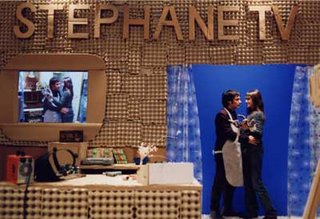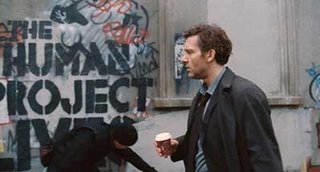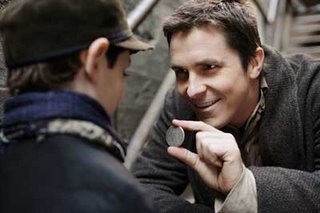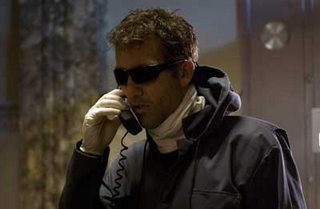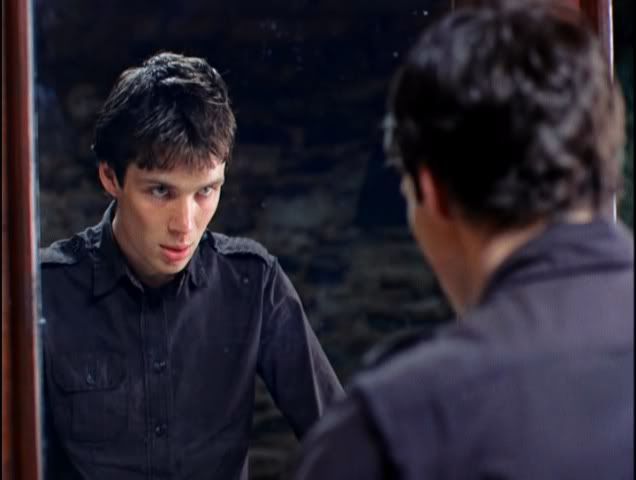Time to Revisit Some Films from the Past
I recently started re-watching some movies that I had liked in the past, but with a certain degree of ambivalence. In these cases I had the feeling that I was watching something important, or at least meaningful, but my perception was usually marred by a state of advanced inebriation. The three movies that I revisited this week were Barton Fink; Synecdoche, New York; and Young Adam.
SYNECDOCHE, NEW YORK

This movie made many “Best of the 2000s” lists and was declared to be the best film of the decade by Roger Ebert. Upon re-watching, armed with a notebook and relative sobriety, I found the movie to be much less incomprehensible than the first time around. It's a film with almost infinite layers of detail that could be endlessly picked apart and debated. In my opinion it's an interesting and profound film, but also happens to be marred by an exceptionally dark worldview.
I don't feel qualified to make any sort of deep analysis of the film (which would be impossible after only two viewings at any rate), but I feel like a few possible broad readings exist. One would be that the entire film happens in the main protagonist's mind, possibly as he's hallucinating on his deathbed. Another is that the entire film happens in some sort of alternate universe that doesn't really follow our universe's laws of space and time. Regardless of how the movie is viewed, the main character Caden Cotard (played by Phillip Seymour Hoffman) is shuffling through his life in a state of extreme depression, unable to enjoy even one small moment because of the knowledge of his impending death. He has grand ambition and wants to leave behind something which will last after he dies, and does this by staging an ever-growing theater production that ultimately has the scale of an entire city. Caden is stymied by his mind which endlessly runs in self-defeating circles, and as a result the play is always stuck in production.
There are clues that suggest the movie is taking place in the protagonist's mind, such as Caden's appearance in cartoons and commercials on the TV set, and a sudden cascade of horrific medical complaints that would never occur simultaneously in real life. The conventions of how time is portrayed in movies is also thrown out the window, and it's difficult to tell whether it's minutes or years that have passed between successive scenes. These could also just indicate that Caden is too solipsistic to even attempt to see things from anything but his own perspective.
Other clues suggest the movie is taking place in a different universe: A war is raging in the streets outside (although all the main characters are oblivious to it), people walk down the streets in gas masks, and a huge blimp floats over the city, searching the streets below with a giant light. The movie does not allow you to get a solid sense of time or place and has a vaguely hallucinatory quality as a result.
I believe the basic theme of the movie is stated explicitly: “The end is built into the beginning.” Armed with the inescapable fact that he will die, Caden attempts to stage his grandiose play in an attempt to break through the facade of humanity and reach “the brutal truth.” Unfortunately in this film, the brutal truth can only mean the basic facts of sickness, sadness, and death, ignoring the infinity of other possibilities contained in a human life. I certainly hope that the director Charlie Kaufman doesn't share Caden's worldview (at least not all the time - his other films have shown considerably more lightness), because if this is indeed his perspective, it must be awful to be trapped in his head.
BARTON FINK

This movie is also about a playwright, named Barton Fink (played by John Turturro). He has reached a certain level of success as a writer in New York, and is hired to write for the “pictures” in Los Angeles. Fink thinks that he is an important artist and continually sets himself apart from others, but also ironically tries to empathize with “the common man” by portraying his plight. Once he arrives in Los Angeles he discovers that the producer wants him to work on wrestling pictures (which he considers beneath him) and is only concerned with profit, not art. This begins an internal struggle which results in a severe case of writer's block, during which he meets and converses with his neighbor, Charlie Meadows (John Goodman.)
This is another film which may take place in large parts entirely in the protagonist's mind, and although the structure and setting are much more simplistic than those of Synecdoche, New York, it is not any more obvious what is really happening. Word gets out that a serial killer is on the loose in L.A., and Barton Fink becomes convinced that Charlie is the killer. Then there's the troublesome box that Charlie left for him to watch, neatly wrapped with a bow, and just the right size for a human head...
In spite of the tone of uncertainty and dread, I was never completely engaged by this film (and felt the same way the first time I saw it, many years ago.) It's nice to see the Coen Brothers' regular actors in one of their earlier films, and the film is concise and carefully paced. In spite of all this the movie seems slight - there are so many unknowns by the end of the film that rather than discuss or argue the possibilities, I'd rather just forget it and admit that it could mean anything, but we'll never really know.
YOUNG ADAM

I saw this movie when it was new in the theaters, and haven't seen it since then. It struck me then as a minimal masterpiece of existential angst, sort of a modern spin on The Stranger by Albert Camus. All the details are different of course, but the tone is nearly identical. I have to admit I have not read the source material, a novel by Alexander Trocchi.
The setting is a constantly gray and overcast Scotland in what seems to be the early 1960s. The sexual revolution is in full swing, but the characters are just going through the motions out of what seems to be a basic, animal necessity. I thought this movie was released in 2004 as an unrated version, but the only DVD available in the U.S. is rated R. The sex scenes (and there are many) are relatively graphic, but I don't recall anything from the theater version which is missing on the DVD. There is a scene which would have entered the lexicon of disturbing cinematic sex scenes if only Young Adam had been better-received; it's an homage to the infamous butter scene from Last Tango in Paris, only this time custard is involved. And of course even the casual moviegoer knows by now that Ewan McGregor is uncircumcised.
The main character played by McGregor, named Joe, works on a coal barge in Glasgow, which must be one of the least glamorous jobs of all time. He initiates an affair with his boss's wife (Tilda Swinton, amazing in everything) by staring at her creepily until she finally gives in to his advances. In fact, he seduces every woman in the movie with this same creepy-stare technique, which I should point out will only work for guys who happen to look like Ewan McGregor. Joe and his boss fish a female corpse out of the water, and through a chain of flashbacks that I won't discuss here, it's revealed that Joe knows more about the situation than he admits to; later he discovers that an innocent man is being prosecuted for the woman's murder. It's difficult to determine whether Joe is amoral or simply incapable of action; earlier in the film it is established that Joe is an aspiring writer, but ends up merely getting drunk every day while his girlfriend goes to work to earn money. Later in the film while he is working on the barge, he nearly always has a book in hand, and conveys a general sense of profound intelligence merely by being quiet and reading a lot. In the end I think the movie may depict not a profound man having an existential crisis, but rather a self-centered man who merely gets away with whatever he can get away with, and who seems profound only because of his total emptiness of character.
SYNECDOCHE, NEW YORK

This movie made many “Best of the 2000s” lists and was declared to be the best film of the decade by Roger Ebert. Upon re-watching, armed with a notebook and relative sobriety, I found the movie to be much less incomprehensible than the first time around. It's a film with almost infinite layers of detail that could be endlessly picked apart and debated. In my opinion it's an interesting and profound film, but also happens to be marred by an exceptionally dark worldview.
I don't feel qualified to make any sort of deep analysis of the film (which would be impossible after only two viewings at any rate), but I feel like a few possible broad readings exist. One would be that the entire film happens in the main protagonist's mind, possibly as he's hallucinating on his deathbed. Another is that the entire film happens in some sort of alternate universe that doesn't really follow our universe's laws of space and time. Regardless of how the movie is viewed, the main character Caden Cotard (played by Phillip Seymour Hoffman) is shuffling through his life in a state of extreme depression, unable to enjoy even one small moment because of the knowledge of his impending death. He has grand ambition and wants to leave behind something which will last after he dies, and does this by staging an ever-growing theater production that ultimately has the scale of an entire city. Caden is stymied by his mind which endlessly runs in self-defeating circles, and as a result the play is always stuck in production.
There are clues that suggest the movie is taking place in the protagonist's mind, such as Caden's appearance in cartoons and commercials on the TV set, and a sudden cascade of horrific medical complaints that would never occur simultaneously in real life. The conventions of how time is portrayed in movies is also thrown out the window, and it's difficult to tell whether it's minutes or years that have passed between successive scenes. These could also just indicate that Caden is too solipsistic to even attempt to see things from anything but his own perspective.
Other clues suggest the movie is taking place in a different universe: A war is raging in the streets outside (although all the main characters are oblivious to it), people walk down the streets in gas masks, and a huge blimp floats over the city, searching the streets below with a giant light. The movie does not allow you to get a solid sense of time or place and has a vaguely hallucinatory quality as a result.
I believe the basic theme of the movie is stated explicitly: “The end is built into the beginning.” Armed with the inescapable fact that he will die, Caden attempts to stage his grandiose play in an attempt to break through the facade of humanity and reach “the brutal truth.” Unfortunately in this film, the brutal truth can only mean the basic facts of sickness, sadness, and death, ignoring the infinity of other possibilities contained in a human life. I certainly hope that the director Charlie Kaufman doesn't share Caden's worldview (at least not all the time - his other films have shown considerably more lightness), because if this is indeed his perspective, it must be awful to be trapped in his head.
BARTON FINK

This movie is also about a playwright, named Barton Fink (played by John Turturro). He has reached a certain level of success as a writer in New York, and is hired to write for the “pictures” in Los Angeles. Fink thinks that he is an important artist and continually sets himself apart from others, but also ironically tries to empathize with “the common man” by portraying his plight. Once he arrives in Los Angeles he discovers that the producer wants him to work on wrestling pictures (which he considers beneath him) and is only concerned with profit, not art. This begins an internal struggle which results in a severe case of writer's block, during which he meets and converses with his neighbor, Charlie Meadows (John Goodman.)
This is another film which may take place in large parts entirely in the protagonist's mind, and although the structure and setting are much more simplistic than those of Synecdoche, New York, it is not any more obvious what is really happening. Word gets out that a serial killer is on the loose in L.A., and Barton Fink becomes convinced that Charlie is the killer. Then there's the troublesome box that Charlie left for him to watch, neatly wrapped with a bow, and just the right size for a human head...
In spite of the tone of uncertainty and dread, I was never completely engaged by this film (and felt the same way the first time I saw it, many years ago.) It's nice to see the Coen Brothers' regular actors in one of their earlier films, and the film is concise and carefully paced. In spite of all this the movie seems slight - there are so many unknowns by the end of the film that rather than discuss or argue the possibilities, I'd rather just forget it and admit that it could mean anything, but we'll never really know.
YOUNG ADAM

I saw this movie when it was new in the theaters, and haven't seen it since then. It struck me then as a minimal masterpiece of existential angst, sort of a modern spin on The Stranger by Albert Camus. All the details are different of course, but the tone is nearly identical. I have to admit I have not read the source material, a novel by Alexander Trocchi.
The setting is a constantly gray and overcast Scotland in what seems to be the early 1960s. The sexual revolution is in full swing, but the characters are just going through the motions out of what seems to be a basic, animal necessity. I thought this movie was released in 2004 as an unrated version, but the only DVD available in the U.S. is rated R. The sex scenes (and there are many) are relatively graphic, but I don't recall anything from the theater version which is missing on the DVD. There is a scene which would have entered the lexicon of disturbing cinematic sex scenes if only Young Adam had been better-received; it's an homage to the infamous butter scene from Last Tango in Paris, only this time custard is involved. And of course even the casual moviegoer knows by now that Ewan McGregor is uncircumcised.
The main character played by McGregor, named Joe, works on a coal barge in Glasgow, which must be one of the least glamorous jobs of all time. He initiates an affair with his boss's wife (Tilda Swinton, amazing in everything) by staring at her creepily until she finally gives in to his advances. In fact, he seduces every woman in the movie with this same creepy-stare technique, which I should point out will only work for guys who happen to look like Ewan McGregor. Joe and his boss fish a female corpse out of the water, and through a chain of flashbacks that I won't discuss here, it's revealed that Joe knows more about the situation than he admits to; later he discovers that an innocent man is being prosecuted for the woman's murder. It's difficult to determine whether Joe is amoral or simply incapable of action; earlier in the film it is established that Joe is an aspiring writer, but ends up merely getting drunk every day while his girlfriend goes to work to earn money. Later in the film while he is working on the barge, he nearly always has a book in hand, and conveys a general sense of profound intelligence merely by being quiet and reading a lot. In the end I think the movie may depict not a profound man having an existential crisis, but rather a self-centered man who merely gets away with whatever he can get away with, and who seems profound only because of his total emptiness of character.




